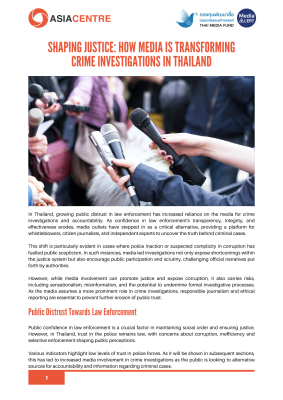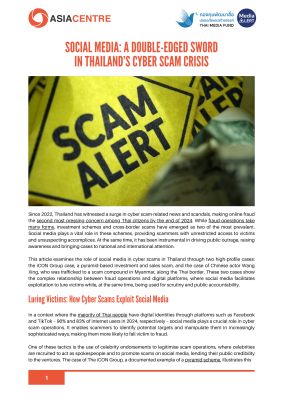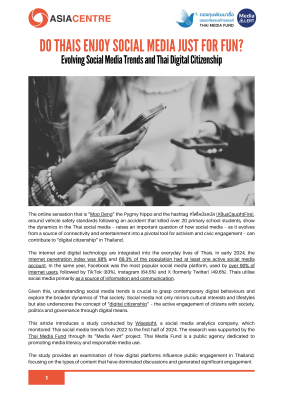briefing notes
Shaping Justice: How Media is Transforming Crime Investigations in Thailand
The article “Shaping Justice: How Media is Transforming Crime Investigations in Thailand” examines how growing public distrust in Thailand’s law enforcement has led media outlets to take on a more prominent role in investigating crime and exposing corruption. As confidence in the police diminishes, the media emerges as a critical platform for whistleblowers, citizen journalists, and independent experts. Yet, while this shift promotes transparency and accountability, it also raises concerns about sensationalism, misinformation and the risk of undermining formal investigative processes.
Social Media: A Double-Edged Sword in Thailand’s Cyber Scam Crisis
The article “Social Media: A Double-Edged Sword in Thailand’s Cyber Scam Crisis” examines the role of social media in cyber scams in Thailand through two high-profile cases: the iCON Group case, a pyramid-based investment and sales scam, and the case of Chinese actor Wang Xing, who was trafficked to a scam compound in Myanmar, along the Thai border. These two cases show the complex relationship between fraud operations and digital platforms, where social media facilitates exploitation to lure victims while, at the same time, being used for scrutiny and public accountability.
Do Thais Enjoy Social Media Just For Fun? Evolving Social Media Trends and Thai Digital Citizenship
The study “Do Thais Enjoy Social Media Just For Fun? Evolving Social Media Trends and Thai Digital Citizenship” conceptualises Thai social media trends from 2022 to the first half of 2024 to provide an examination of how digital platforms influence public engagement in Thailand, focusing on the types of content that have dominated discussions and generated significant engagement during this period. Furthermore, the article explores the intersection of social media and socio-political advocacy, presenting some key findings that illustrate how these platforms can shape public engagement and foster digital citizenship.
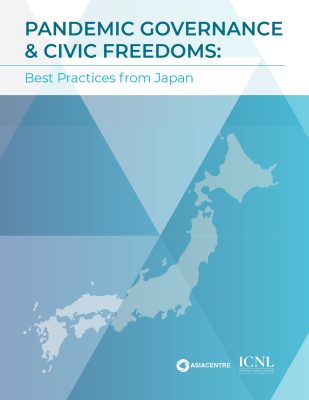
Pandemic Governance & Civic Freedoms: Best Practices from Japan
Pandemic Governance & Civic Freedoms: Best Practices from Japan evaluates the approach taken to manage the COVID-19 pandemic in the country. For the Japanese people, civic freedoms are a fundamental aspect of citizens’ rights. Hence, Japan’s approach during the pandemic was to balance civic freedoms while ensuring public health and safety. With a range of less coercive measures, such as a less coercive state of emergency and legislative amendments, transparent communication, collaborative efforts from state and non-state actors, and healthcare-led decision-making, the country’s fatality rate was among the lowest globally. Japan’s prioritisation of civic freedoms contrasts with the measures adopted by other governments in China and Cambodia, for example, where people’s freedoms were severely curtailed. Nevertheless, some areas for improvement are also underscored in the report in the form of recommendations: such as optimising social media communication and fostering stronger collaborations between state and non-state actors to improve the effective response to future emergencies. Overall, this report argues that Japan’s ability to balance civic freedoms and public health can serve as a role model for other nations to follow in the event of future outbreaks.
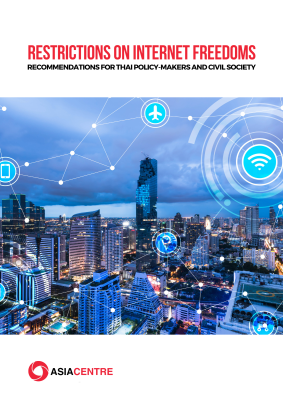
Restrictions on Internet Freedoms: Recommendations for Thai Policy-makers and Civil Society
Restrictions on Internet Freedoms: Recommendations for Thai Policy-makers and Civil Society assesses both legal and non-legal measures that adversely affect online internet usage in Thailand. These measures encompass the Country’s Penal Code, Computer Crime Act, Internal Security Act, information operations, and targeted online surveillance. The presence of vaguely-worded laws has facilitated the direct persecution of internet and social media users based on their content and exercise of freedom of expression. Moreover, these laws provide a legal basis for online surveillance and state-sponsored disinformation campaigns against critics. This report analyses the resulting impacts of such measures and offers key recommendations to ameliorate the situation and provides a set of recommendations for the government to improve internet freedoms in the country.
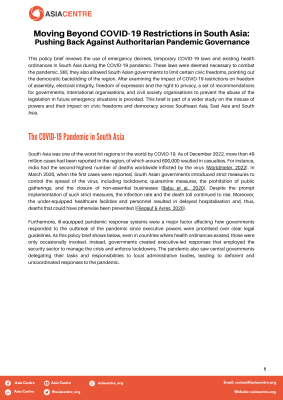
Moving Beyond COVID-19 Restrictions in South Asia: Pushing Back Against Authoritarian Pandemic Governance
In South Asia, governments tended to adopt two approaches to contain the spread of the pandemic. The Maldives and Sri Lanka declared state of emergencies, while Bangladesh, India and Nepal relied on temporary health emergency laws. Regardless of the differences between these two approaches, all these measures restricted people’s civic freedoms, thus curbing democracy in the region. The policy brief “Moving Beyond COVID-19 Restrictions in South Asia: Pushing Back Against Authoritarian Pandemic Governance” makes an assessment of the impact of anti-COVID-19 legal measures on people’s fundamental rights in South Asia.

Moving Beyond COVID-19 Restrictions in East Asia: Pushing Back Against Authoritarian Pandemic Governance
In East Asia, regional countries have sought two main approaches to managing COVID-19. On the one hand, Japan, South Korea and Taiwan adopted anti-COVID-19 measures that aligned with international human rights standards. On the other hand, China, North Korea, Hong Kong’s “Zero-COVID” mechanisms to contain the pandemic were more restrictive, threatening people’s fundamental rights. The policy brief “Moving Beyond COVID-19 Restrictions in East Asia: Pushing Back Against Authoritarian Pandemic Governance” provides an overview of these two approaches and the impact on human rights in East Asia.
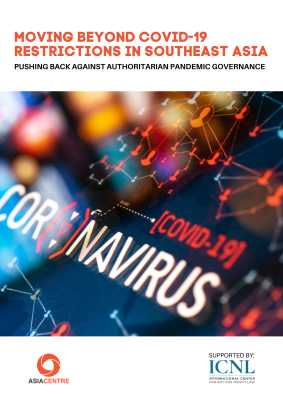
Moving Beyond COVID-19 Restrictions in Southeast Asia: Pushing Back Against Authoritarian Pandemic Governance
The policy paper “Moving Beyond COVID-19 Restrictions in Southeast Asia: Pushing Back Against Authoritarian Pandemic Governance” explores how the use of powers by Southeast Asian governments during the COVID-19 pandemic derogated rights. Emergency and temporary laws, as well as special provisions in infectious disease laws, impacted fundamental rights beyond what was necessary to keep the virus at bay. Consequently, control over the population was tightened and democracy backtracked. The paper demonstrates that governments used COVID-laws to amass disproportionate power and over-restrict civic freedoms on four ends. First, strict lockdowns were used to stifle freedom of assembly and protest. Second, anti-COVID measures were used by ruling political elites to limit campaigning activities and ensure that the status quo remained unchanged, partially disenfranchising voters from electoral processes. Third, fake-news laws were implemented to contain the spread of false information regarding the pandemic. Still, such laws were also used to silence political dissent. Fourth, online and physical surveillance increased to track the spread of the virus and, more generally, to track people’s actions beyond the essential to ensure public health. Given these developments, this paper includes a set of recommendations directed at governments, international organisations, and civil society organisations to improve governance in the post-pandemic era so that anti-COVID measures do not derogate people’s fundamental rights. Implementing these recommendations can help prevent and push back against the implications of authoritarian pandemic governance in Southeast Asia.
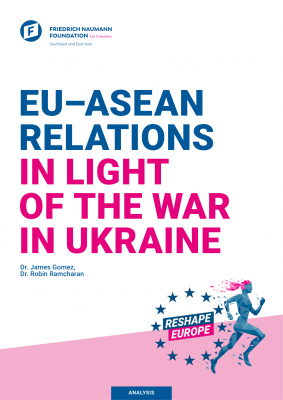
EU-ASEAN Relations in Light of the War in Ukraine
The EU and ASEAN have set to resume negotiations aiming at an inter-regional FTA. However, this process will be undertaken in the context of the geopolitical and geoeconomic situation in the Indo-Pacific. Deep existing issues such as conflicting values also have an impact on the negotiation process. Moreover, the war in Ukraine have increased the need for the EU to have a presence in the region. The policy paper “EU-ASEAN Relations in Light of the War in Ukraine” assesses these issues against both regions’ aim of striking a deal on trade as a foundation for deeper cooperation and develops recommendations for the EU to increase its engagement towards ASEAN and SEA.
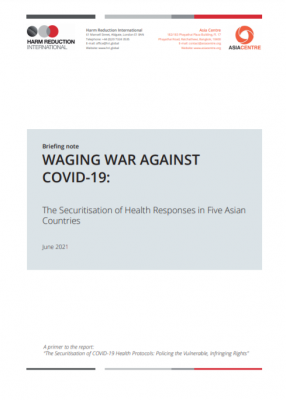
Waging War Against COVID-19
The Securitisation of the Health Response in Five Asian Countries evaluates the various health responses enacted by Indonesia, Malaysia, the Philippines, Singapore and Sri Lanka. This briefing note categories the health responses as blended civil, securitised or militarised. Such an approach shows that authorities in the region, tackling the COVID-19 situation, primarily approach it as public security rather than a public health threat. This briefing note is a prelude to the full report The Securitisation of COVID-19 Health Protocols: Policing the Vulnerable, Infringing their Rights.
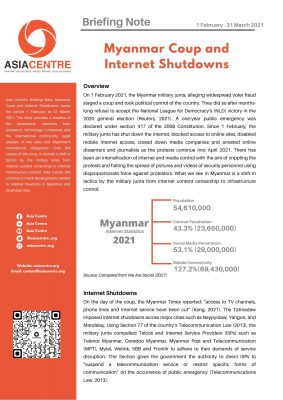
Myanmar Coup and Internet Shutdowns
Asia Centre’s Briefing Note, Myanmar Coup and Internet Shutdowns, tracks the period 1 February to 31 March 2021. The Note provides a timeline of the shutdowns, reactions from protestors, technology companies and the international community, legal analysis of key laws and Myanmar’s international obligations. Over the course of the coup, it records a shift in tactics by the military junta from internet content censorship to infrastructure control. Asia Centre will continue to track developments related to internet freedoms in Myanmar and Southeast Asia.
View an earlier edition of the note, tracking the period from 1 to 15 February 2021, here.

